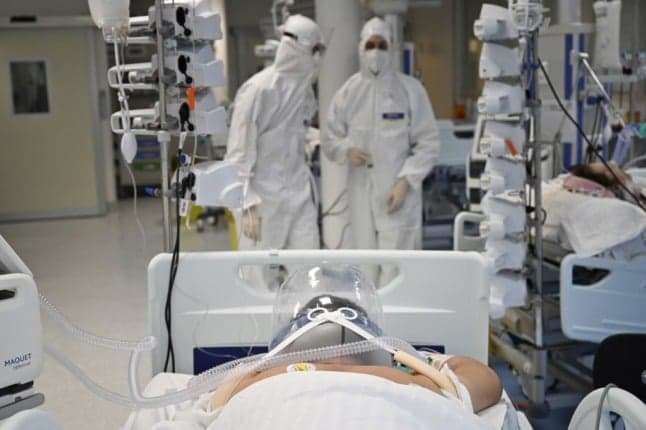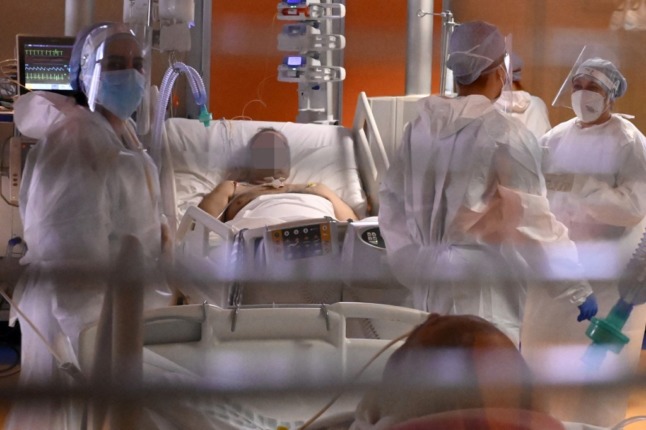Italian hospitals 'inundated' by Covid patients as daily case number hits 126,000

As Italy's daily coronavirus infection rate soared past the symbolic milestone of 100,000 on Thursday, medical staff say ever-higher numbers of hospital admissions are putting them under strain.
"We are inundated," medical director Antonino Marchese says wearily as his Rome Covid hospital fills up with patients, most of them unvaccinated despite the country bringing in restrictions for those who choose not to get the jab.
As daily coronavirus infections in Italy hit a new high of over 126,000 on Thursday, hospital admissions are also rising again due to the new Omicron variant and the persisting reluctance among some to get vaccinated.
READ ALSO: Italy announces new Covid quarantine and green pass rules as cases surge
At Rome's Casalpalocco hospital, the situation has been "serious" for about a month, Marchese told AFP.
Of the facility's 120 beds, 111 are now filled by patients suffering from the Covid-19 disease.
"We are inundated with requests for admission. It's a constant pressure," said Marchese, adding that he expects numbers to rise further.
Almost three-quarters of the hospital's Covid patients are unvaccinated, and some resist intubation when taken to the intensive care unit.
"Then they generally accept because they realise how serious it is and then they can no longer breathe on their own," he said.
The majority of patients in intensive care are elderly, but younger people also fill up beds "because they have to be constantly and precisely monitored to see if they need to be ventilated", Marchese said.

Photo: Alberto PIZZOLI / AFP
Throughout Italy, other hospitals report a similar phenomenon.
Whereas 10 percent of all Italy’s intensive care beds were occupied by Covid patients on December 17, that number has crept up to 13 percent in the past two days, according to Italy's National Agency for Regional Health Services.
Some regions are under more pressure, such as Veneto, at 18 percent, and Lazio - of which Rome is the capital - at 16 percent.
Although 85.8 percent of the country's population over the age of 12 has been fully inoculated, there remain roughly six million unvaccinated over-12s, according to official data.
"In my opinion, in Italy we've managed to steer the population towards a certain favourable vaccination trend," said Marchese.
"Of course, the no-vax people exist everywhere, even here."
To try to convince them further, Italy's government on Wednesday announced even more stringent restrictions on the unvaccinated, effectively barring them from hotels, gyms, restaurants and even public transport.
From January 10th, Italy’s ‘reinforced’ green pass - which shows proof of vaccination status or recovery from Covid-19 - will be required to access many places previously accessible to the unvaccinated via a negative Covid test.
The government also scrapped a seven-day quarantine requirement for fully vaccinated people who come into contact with a positive case, amid concerns that the country would grind to a halt with millions of people forced to stay home.
Q&A: What are Italy’s new Covid quarantine rules?
The new curbs, aimed at increasing vaccination rates further amid the new wave of contagion, were announced as Italy soared past the symbolic threshold of 100,000 new daily cases to a total of 126,888 on Thursday.
The test positivity rate rose from 9.5 percent on Wednesday to 11 percent.
Intensive care cases are up by 41 to 1,226, and hospital admissions up 288, now totalling 10,866.
Comments (3)
See Also
"We are inundated," medical director Antonino Marchese says wearily as his Rome Covid hospital fills up with patients, most of them unvaccinated despite the country bringing in restrictions for those who choose not to get the jab.
As daily coronavirus infections in Italy hit a new high of over 126,000 on Thursday, hospital admissions are also rising again due to the new Omicron variant and the persisting reluctance among some to get vaccinated.
READ ALSO: Italy announces new Covid quarantine and green pass rules as cases surge
At Rome's Casalpalocco hospital, the situation has been "serious" for about a month, Marchese told AFP.
Of the facility's 120 beds, 111 are now filled by patients suffering from the Covid-19 disease.
"We are inundated with requests for admission. It's a constant pressure," said Marchese, adding that he expects numbers to rise further.
Almost three-quarters of the hospital's Covid patients are unvaccinated, and some resist intubation when taken to the intensive care unit.
"Then they generally accept because they realise how serious it is and then they can no longer breathe on their own," he said.
The majority of patients in intensive care are elderly, but younger people also fill up beds "because they have to be constantly and precisely monitored to see if they need to be ventilated", Marchese said.

Throughout Italy, other hospitals report a similar phenomenon.
Whereas 10 percent of all Italy’s intensive care beds were occupied by Covid patients on December 17, that number has crept up to 13 percent in the past two days, according to Italy's National Agency for Regional Health Services.
Some regions are under more pressure, such as Veneto, at 18 percent, and Lazio - of which Rome is the capital - at 16 percent.
Although 85.8 percent of the country's population over the age of 12 has been fully inoculated, there remain roughly six million unvaccinated over-12s, according to official data.
"In my opinion, in Italy we've managed to steer the population towards a certain favourable vaccination trend," said Marchese.
"Of course, the no-vax people exist everywhere, even here."
To try to convince them further, Italy's government on Wednesday announced even more stringent restrictions on the unvaccinated, effectively barring them from hotels, gyms, restaurants and even public transport.
From January 10th, Italy’s ‘reinforced’ green pass - which shows proof of vaccination status or recovery from Covid-19 - will be required to access many places previously accessible to the unvaccinated via a negative Covid test.
The government also scrapped a seven-day quarantine requirement for fully vaccinated people who come into contact with a positive case, amid concerns that the country would grind to a halt with millions of people forced to stay home.
Q&A: What are Italy’s new Covid quarantine rules?
The new curbs, aimed at increasing vaccination rates further amid the new wave of contagion, were announced as Italy soared past the symbolic threshold of 100,000 new daily cases to a total of 126,888 on Thursday.
The test positivity rate rose from 9.5 percent on Wednesday to 11 percent.
Intensive care cases are up by 41 to 1,226, and hospital admissions up 288, now totalling 10,866.
Join the conversation in our comments section below. Share your own views and experience and if you have a question or suggestion for our journalists then email us at [email protected].
Please keep comments civil, constructive and on topic – and make sure to read our terms of use before getting involved.
Please log in here to leave a comment.